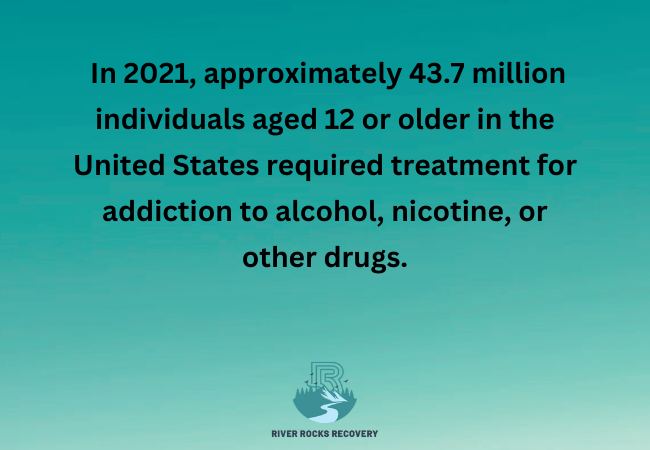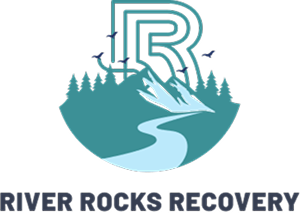Addiction is a serious and complex disease that affects millions of people worldwide. Some drugs are more addictive than others, leading to faster dependence and making it extremely difficult to quit without professional treatment. Whether it’s opioids, methamphetamine, cocaine, or alcohol, these substances can cause physical, emotional, and psychological damage that disrupts lives.
Fortunately, professional rehab programs provide the support, medical care, and therapy necessary to break the cycle of addiction. At River Rocks Recovery, we offer specialized addiction treatment in Ohio, including opiate rehab, meth rehab, and outpatient rehab programs designed to help individuals regain control over their lives.
In This Guide, We Will Cover:
- The most addictive drugs and how they affect the brain
- Physical, psychological, and emotional signs of addiction
- The dangers of long-term drug abuse
- The importance of rehab in breaking addiction cycles
- Different treatment options available in Ohio for long-term recovery
If you or someone you love is struggling with substance use disorder, this guide will help you understand why some drugs are highly addictive and how professional rehab can provide lasting recovery.
The Most Addictive Drugs and Their Effects
Certain substances are known for their high addiction potential, meaning they cause rapid physical and psychological dependence. Below are some of the most addictive drugs, how they affect the brain, and why professional treatment is necessary.
1. Opioids (Heroin, Fentanyl, Prescription Painkillers)
Opioids are among the most highly addictive drugs, leading to severe physical dependence and withdrawal symptoms.
Common Opioids:
- Heroin
- Fentanyl (50-100 times stronger than heroin)
- Oxycodone (OxyContin, Percocet)
- Hydrocodone (Vicodin)
- Morphine
How Opioids Affect the Brain
Opioids bind to receptors in the brain, flooding the body with dopamine—a neurotransmitter responsible for pleasure and pain relief. Over time, the brain stops producing dopamine naturally, leading to intense cravings and withdrawal symptoms when drug use stops.
Dangers of Long-Term Opioid Use
- Respiratory depression, which can lead to fatal overdose
- Brain changes that cause severe addiction and cravings
- High risk of infectious diseases from injecting (HIV, Hepatitis C)
Withdrawal Symptoms:
- Severe muscle and bone pain
- Nausea, vomiting, and diarrhea
- Sweating, chills, and tremors
- Depression and intense cravings
2. Methamphetamine (Meth, Crystal Meth)
Methamphetamine is a powerful stimulant that dramatically increases dopamine levels, causing extreme energy, alertness, and euphoria.
How Meth Affects the Brain
Meth destroys dopamine receptors, making it incredibly difficult for individuals to feel pleasure naturally. This leads to severe depression, paranoia, and violent behavior when coming down from a meth high.
Dangers of Long-Term Meth Use
- Severe weight loss and malnutrition
- Tooth decay (“meth mouth”)
- Permanent brain damage and memory loss
- Paranoia, hallucinations, and psychosis
Withdrawal Symptoms:
- Extreme depression and fatigue
- Suicidal thoughts
- Irritability and aggression
- Intense drug cravings
3. Cocaine and Crack Cocaine
Cocaine is a highly addictive stimulant that creates a short-lived high, leading users to binge on the drug repeatedly. Crack cocaine is an even more potent and smokable form, making addiction develop even faster.
How Cocaine Affects the Brain
Cocaine blocks dopamine reabsorption, leading to a brief but intense high. When the drug wears off, users experience extreme depression and cravings, leading to repeated use.
Dangers of Long-Term Cocaine Use
- Heart attacks, strokes, and high blood pressure
- Damage to the nose and lungs from snorting or smoking
- Paranoia, mood swings, and violent behavior
Withdrawal Symptoms:
- Severe depression and suicidal thoughts
- Fatigue and excessive sleeping
- Intense cravings
- Anxiety and paranoia
4. Alcohol
Although legal, alcohol is one of the most commonly abused substances, leading to severe dependence and withdrawal symptoms.
How Alcohol Affects the Brain
Alcohol depresses the central nervous system, making people feel relaxed or euphoric. However, excessive alcohol use changes brain chemistry, making quitting difficult.
Dangers of Long-Term Alcohol Use
- Liver disease, cirrhosis, and pancreatitis
- Brain damage, memory loss, and cognitive decline
- High risk of alcohol poisoning and overdose
Withdrawal Symptoms:
- Shaking, sweating, and tremors
- Seizures (in severe cases)
- Delirium tremens (DTs), which can be fatal
Understanding the Cycle of Addiction
Addiction follows a cycle that makes it difficult to stop without professional treatment.
The Stages of Addiction:
- Initial Use – Experimenting with drugs or alcohol.
- Regular Use – Using more frequently.
- Risky Use – Engaging in dangerous behavior while using.
- Dependence – Experiencing withdrawal when not using.
- Addiction – Inability to stop despite negative consequences.
Breaking this cycle requires professional rehab that addresses both physical dependence and psychological addiction.

How Rehab Can Help Break the Cycle of Addiction
1. Medically Supervised Detox
- Helps individuals safely withdraw from addictive substances.
- Medication-assisted treatment (MAT) helps reduce cravings and discomfort.
2. Comprehensive Treatment Programs
At River Rocks Recovery, we offer various levels of care based on individual needs:
- Opiate Rehab Treatment in Ohio
- Meth Rehab Treatment in Ohio
- Partial Hospitalization Program in Ohio
- Intensive Outpatient Program in Ohio
- Outpatient Program in Ohio
3. Therapy and Relapse Prevention
- Cognitive Behavioral Therapy (CBT) to change negative thought patterns.
- Group and Family Therapy for strong social support.
- Relapse Prevention Planning to reduce the risk of returning to drug use.
Why Choose River Rocks Recovery?
At River Rocks Recovery, we understand that every individual’s journey to recovery is unique. Overcoming addiction requires more than just quitting drugs—it requires a comprehensive treatment approach that addresses physical dependence, mental health, emotional healing, and long-term relapse prevention.
Here’s why we are the top choice for addiction treatment in Ohio:
1. Comprehensive, Evidence-Based Treatment
We use proven, science-backed treatment methods such as:
- Medical Detox & Withdrawal Management – Ensuring a safe and comfortable detox process.
- Cognitive Behavioral Therapy (CBT) & Dialectical Behavior Therapy (DBT) – Addressing negative thought patterns and emotional regulation.
- Medication-Assisted Treatment (MAT) – Reducing cravings and improving recovery outcomes.
2. Individualized Treatment Plans
No two people experience addiction the same way, which is why we offer personalized care plans tailored to each person’s unique needs. Whether you need inpatient rehab, outpatient care, or a combination of both, we create a treatment path designed for your success.
3. Multiple Levels of Care for Every Stage of Recovery
- Opiate Rehab Treatment in Ohio – Specializing in opioid and heroin addiction recovery.
- Meth Rehab Treatment in Ohio – Focused programs for methamphetamine dependence.
- Partial Hospitalization Program in Ohio – Intensive daytime treatment while allowing you to return home at night.
- Intensive Outpatient Program in Ohio – A structured rehab program with flexibility for work or school.
- Outpatient Program in Ohio – Long-term therapy and relapse prevention strategies.
4. Supportive & Compassionate Team
Our team of addiction specialists, medical professionals, and therapists are committed to providing compassionate, judgment-free care. We believe in treating the whole person—not just the addiction—by offering support in mental health, family healing, and lifestyle changes.
5. Long-Term Relapse Prevention & Aftercare
Recovery doesn’t end after rehab—it’s a lifelong journey. That’s why we offer:
- Sober Living Arrangements for a structured, drug-free environment.
- Ongoing Therapy & Support Groups for continued accountability.
- Relapse Prevention Planning to help individuals navigate triggers and stressors.
At River Rocks Recovery, we are dedicated to helping you break the cycle of addiction and build a healthier future.
Conclusion
Addiction does not define you. Recovery is possible, and with the right support, you can break free from the cycle of substance abuse and rebuild a fulfilling life.
At River Rocks Recovery, we are committed to walking alongside you every step of the way, providing personalized care, expert medical support, and evidence-based therapies to ensure long-term success. Whether you’re struggling with opioid addiction, methamphetamine use, alcohol dependency, or any other substance abuse issue, you don’t have to face it alone.
If you or a loved one is battling addiction, the time to seek help is now. Recovery starts with a single decision, and we are here to help you take that step with confidence. Call River Rocks Recovery at 888.905.6281 today for a confidential consultation. Freedom from addiction is possible—let us help you find your path to lasting recovery.
FAQ About Addictive Drugs and Rehab
What are the most addictive drugs?
The most addictive drugs include:
- Opioids (heroin, fentanyl, prescription painkillers)
- Methamphetamine (meth, crystal meth)
- Cocaine and crack cocaine
- Alcohol
- Benzodiazepines (Xanax, Valium, Ativan)
- Nicotine
These substances cause severe physical and psychological dependence, making them extremely difficult to quit without professional help.
Why are some drugs more addictive than others?
Some drugs are more addictive because they quickly alter brain chemistry, leading to:
- Intense dopamine release, which reinforces repeated use.
- Rapid tolerance buildup, requiring higher doses for the same effect.
- Severe withdrawal symptoms, making it harder to quit without medical support.
How do I know if I am addicted to a drug?
Signs of addiction include:
- Loss of control over drug use
- Needing more of the drug to feel the same effects
- Experiencing withdrawal symptoms when stopping
- Neglecting responsibilities due to drug use
- Continuing use despite negative consequences
If you recognize these signs, seeking professional rehab is the next step toward recovery.
What happens during drug withdrawal?
Withdrawal symptoms depend on the drug but can include:
- Opioids: Severe muscle pain, nausea, sweating, anxiety
- Methamphetamine: Depression, fatigue, intense cravings
- Cocaine: Extreme mood swings, irritability, paranoia
- Alcohol: Tremors, seizures, delirium tremens (DTs)
Since withdrawal can be dangerous, medical detox is recommended for a safe and comfortable transition into recovery.
How does rehab help people overcome drug addiction?
Rehab provides:
- Medical detox to safely remove substances from the body.
- Individual and group therapy to address underlying issues.
- Behavioral therapy (CBT, DBT) to change negative thought patterns.
- Medication-assisted treatment (MAT) for opioid and alcohol addiction.
- Relapse prevention strategies to maintain long-term sobriety.

